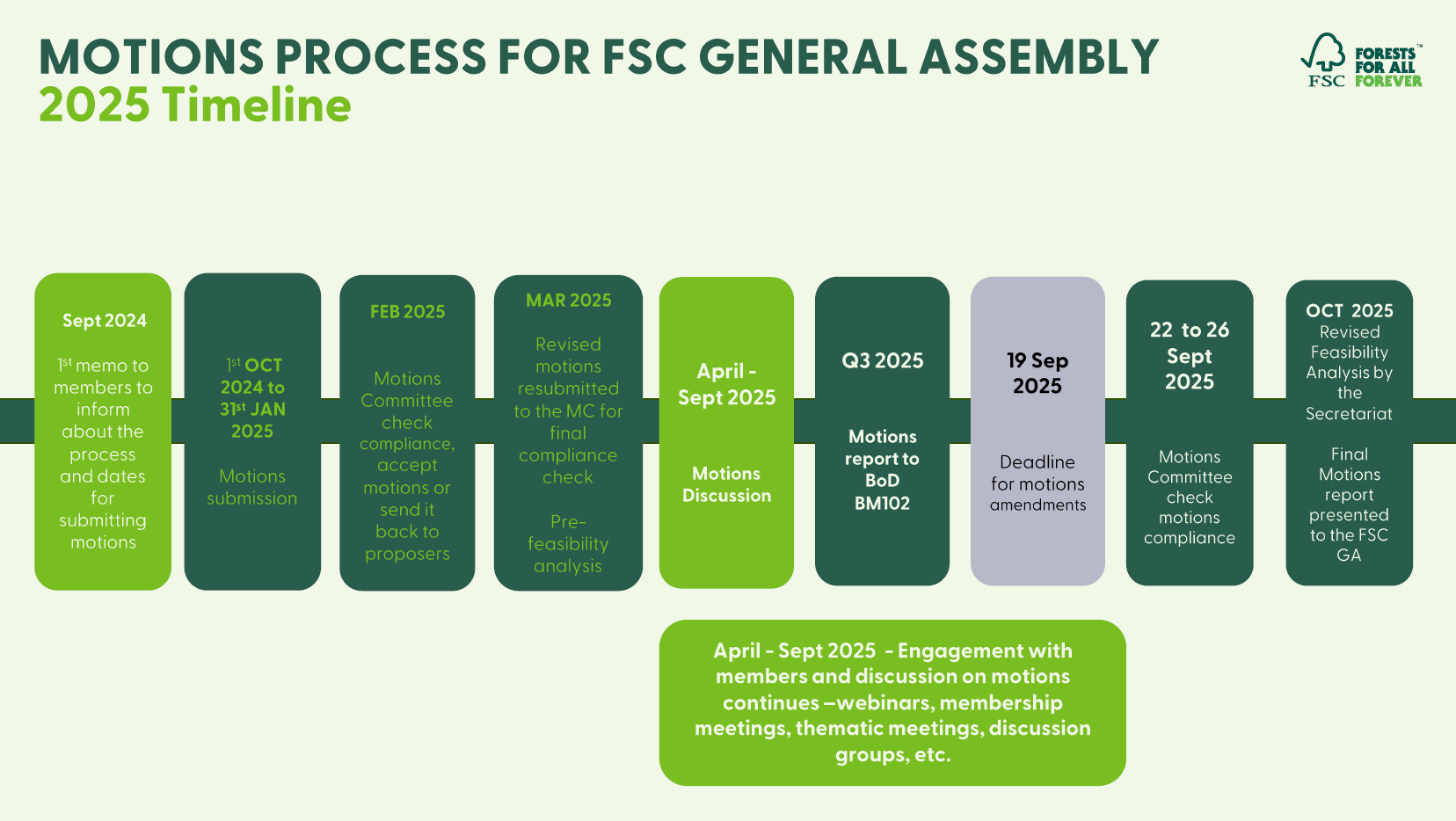

In this session, members had the opportunity to discuss with the motion’s proposers and members. The motions discussed were:
We hosted two identical sessions to accommodate different time zones.

The FSC Global Membership Meeting 2020 presented a general overview and highlights of the achievements in 2020, and general priorities and key issues for 2021.
In order to accommodate several time zones and enable the participation of our members from all regions, the session was held in the morning and repeated in the afternoon. Both sessions ran live and contained the same discussions.
Over 400 registered participants from around the world joined the presentations and subsequent discussions. You can find the meeting recordings and presentations below.

During this session, we will present the motion submission schedule and we will have a demo on how to submit a motion through the FSC Motions platform.


We hosted two identical meetings to allow the participation of our global membership. These took place via Zoom.
You can watch the recordings of the main plenary session here:

The FSC general assembly is FSC’s highest decision-making body, attracting hundreds of participants from indigenous people, environmentalists, business and others in FSC membership. The GA is traditionally held every three years, however the general assembly planned for 2020 was re-scheduled to take place in two parts at the 2021-2022 general assembly. The first part took place virtually in 2021 and the second part will take place as a hybrid event with in-person and online components.
The in-person part of the FSC general assembly is planned to take place in Bali, Indonesia. Learn more about what happens at the general assembly.


Over 200 participants from Latin America joined the presentations and subsequent discussions.
You can find the meeting recording and presentations below.
Scroll down to access the recording of the sessions.



We are seeking FSC chamber members and technical experts with knowledge and experience in forest management and controlled wood for the working group tasked with revising the FSC Controlled Wood Standard for Forest Management Enterprises. The call for applications will be open until 09 February 2020.

The report on the revision of the FSC Principles and Criteria (Version 5-2) is now available for a 50-day public consultation. The main proposal is that FSC should wait until 2023 to revise its Principles and Criteria because the transition of all FSC national standards to the latest Principles and Criteria (Version 5-2) is still ongoing.

In mid-February 2016, the working group tasked to address Motion 12 of the 2014 Forest Stewardship Council (FSC) General Assembly (GA), held its second meeting in Bonn Germany. The working group, which is currently drafting a policy proposal, aims to consult FSC members about the details in April 2016.

The FSC Remedy Framework is now open for public consultation, until 10 May 2022. FSC looks forward to receiving inputs and suggestions from its stakeholders on ways to improve the efficacy of the FSC Remedy Framework. FSC invites all its stakeholders to participate in this consultation process, by clicking here.

EU decision-makers have reached an historic agreement by approving the landmark anti-Deforestation Regulation (EUDR). The EUDR will prohibit placing products linked to deforestation and forest degradation on the EU market.

The Governance Review Working Group, formed to deliver on Motion 42 (2014), has developed governance reform options based on input from members and from experts which we now wish to consult members on. This consultation will run from 10 July to 10 August 2017 through an online platform.

The final version of the FSC Implementation Plan is now available online. This represents a critical step in building the structures and actions to create the changes we want to make together.

FSC launches the public consultation on the draft Advice Note for Indigenous Peoples in Voluntary Isolation and in Initial Contact (IPVIIC) in Peru. The consultation seeks feedback on specific questions related to the draft and is open to all interested stakeholders.


FSC is presenting a new piece of research intended to inform the process to create a fair and feasible FSC Remedy Framework. Entitled “A study on the economics of remedy in the context of forest conversion,” this piece of work was completed by an independent consulting agency.